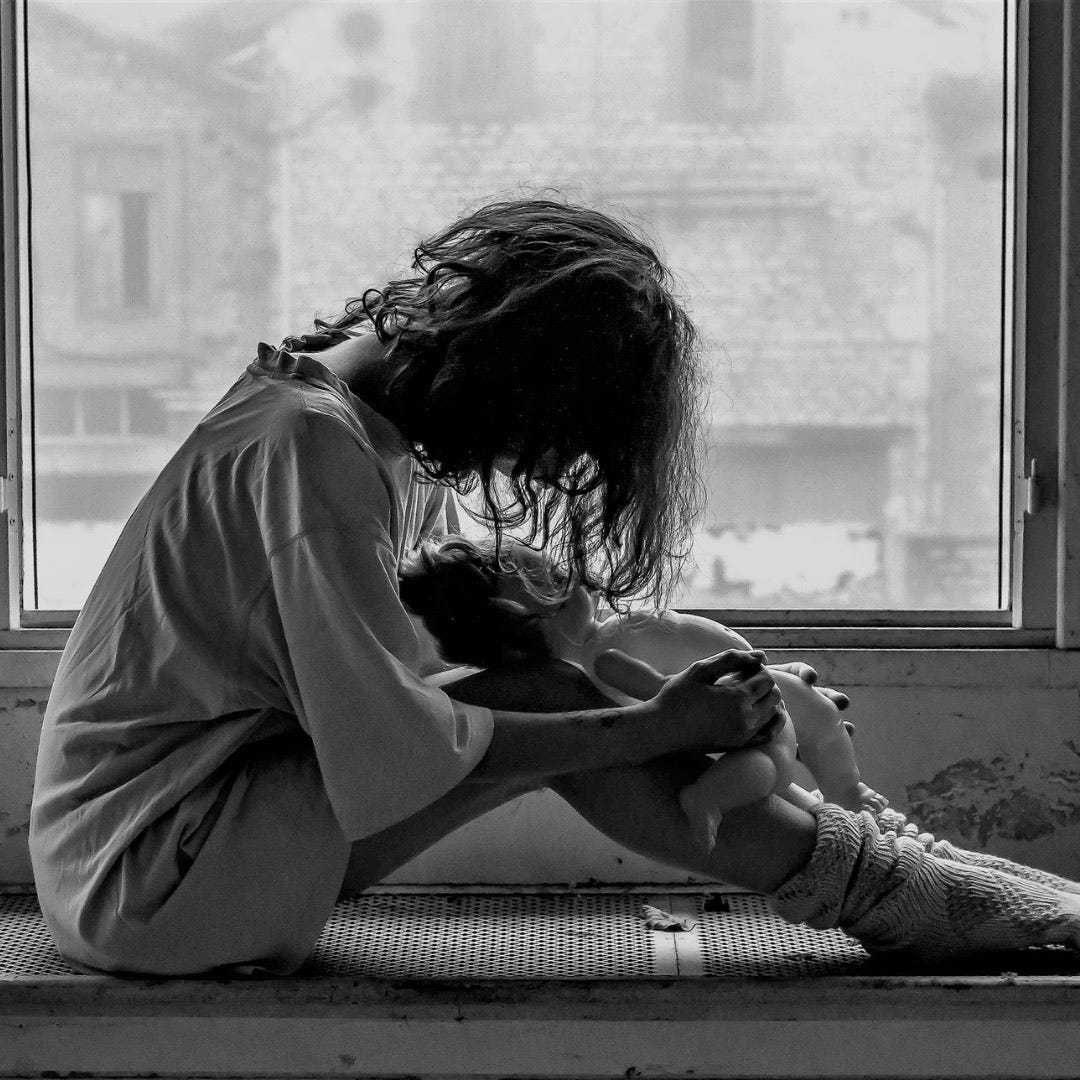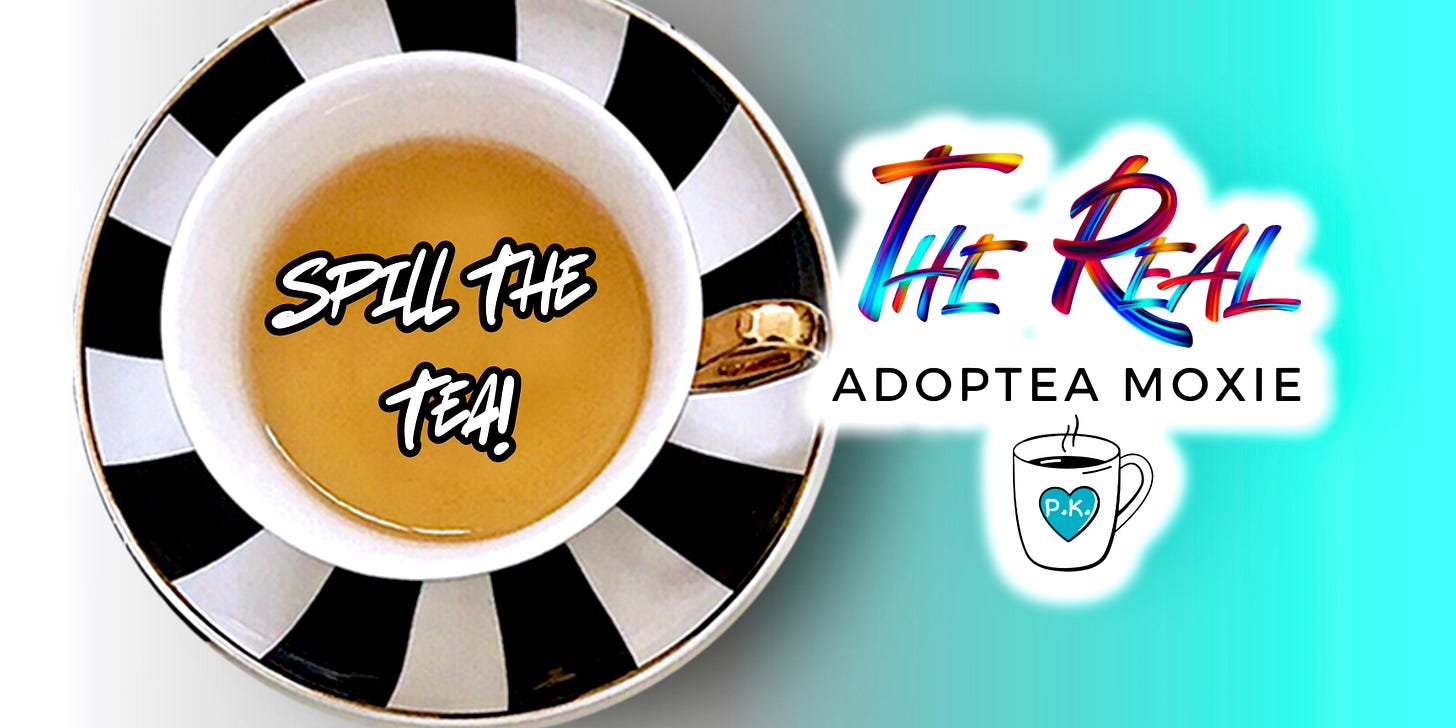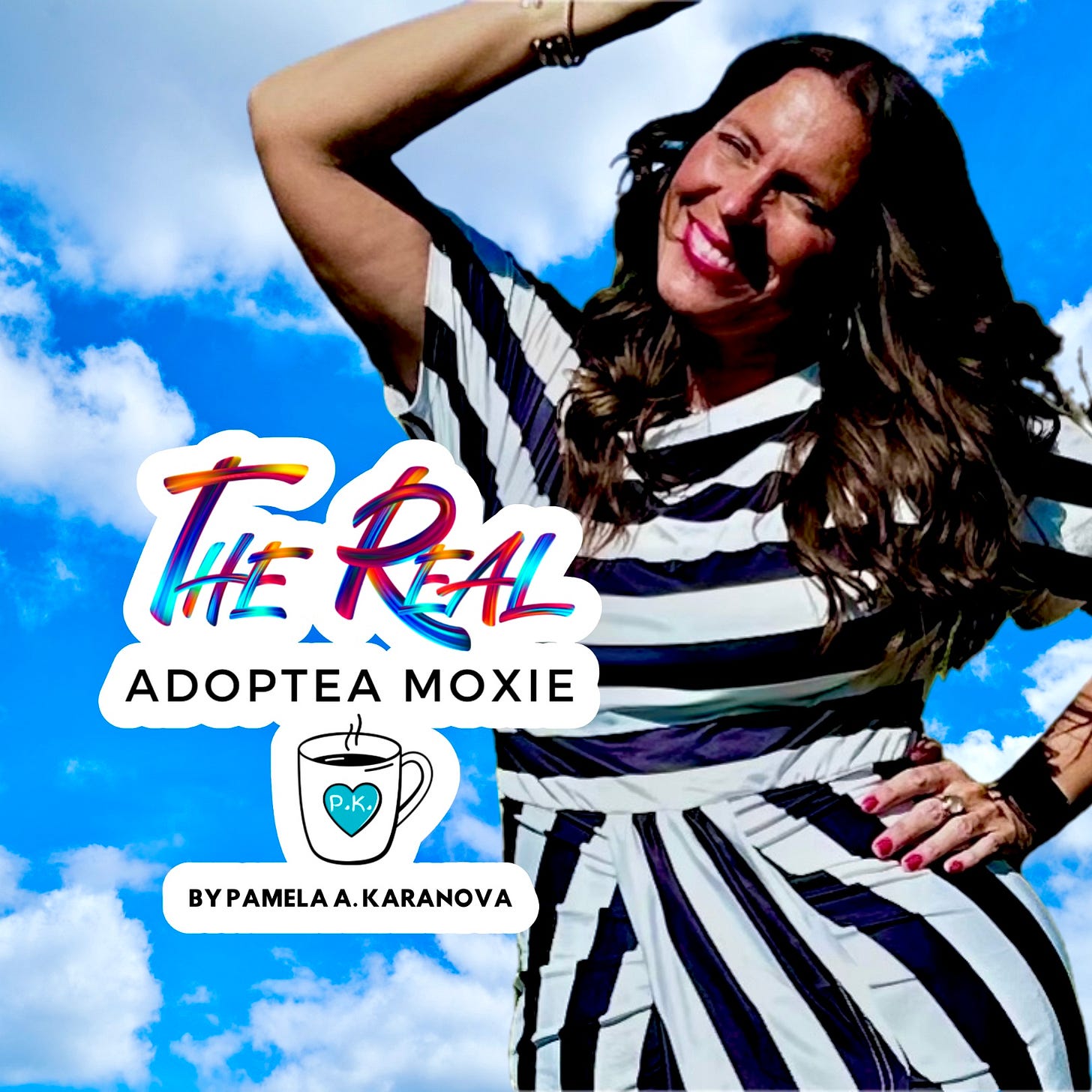The Servitude in Adoption: Adopted for Love or Labor?
Many adoptees are conditioned to believe they owe their adopters endless gratitude for being "rescued." This manipulation strips adoptees of their ability to set boundaries or advocate for themselves.

The romanticized adoption narrative often paints a picture of love, rescue, and belonging. But for many adoptees, the truth is far darker—rooted in servitude, exploitation, and a gross distortion of what childhood should be. Far too often, I hear stories that echo a harrowing theme: adoptees forced into labor, treated less as family and more as unpaid help. It’s a recurring, sinister pattern that cannot be dismissed or ignored.
Adoptees as Servants: A Disturbing Pattern
Time and again, adoptees share stories of being turned into de facto housekeepers, caretakers, and personal servants for their adoptive parents. These are not anecdotes about pitching in with typical childhood chores or being part of a household. This goes far beyond that. Many adoptees describe being forced to scrub floors on their hands and knees, clean baseboards, and perform duties that mirror the degrading servitude of a character like Cinderella.
The outrage doesn’t stop there. I have even witnessed adoptive mothers proudly blasting their social media pages with photos of adoptees on their hands and knees, scrubbing floors and baseboards . These images are shared under the guise of teaching "responsibility" or "work ethic," but what they really display is an adoptee’s humiliation and exploitation for public consumption. The site is enraging and heartbreaking. It’s a public declaration that the labor adoptees are coerced into providing under the guise of parenting.
I’ve also learned that adoptees are brought into farming families explicitly to provide farm labor. Many adoptees don’t even realize this because it’s all they’ve ever known—it feels normal to them. Yet, this "normal" childhood is anything but. These children grow up working long hours in fields, tending to livestock, and carrying the weight of running a family farm, often with little acknowledgment that their role is exploitative.
Why does this theme keep emerging? Why are adoptees recounting childhoods where their worth was measured not in love but in labor? Hearing these accounts makes my blood boil because it reveals a deep-rooted problem in the adoption system—a system that enables the exploitation of vulnerable children under the guise of "family."
The Price of Obedience
I have always felt that my adoptive mother brought me into her home to serve her every want and need. As a child, I didn’t question it. I catered to her whims, cared for her, and molded myself into what she demanded. But the cost was my childhood. While other kids played freely, explored their world, and built their identities, I was busy working, suppressing my desires, and forfeiting my right to be a kid.
This isn’t just my story—it’s one I hear echoed in countless others. Adoptees talk about how their adopters framed this dynamic as expected or even as a privilege. "You owe us," they were told. "We saved you." But at what cost? We didn’t ask to be "saved," nor did we consent to a life of servitude masked as gratitude.
This Is Not Normal Childhood Chores
Let me be clear: every child in a family contributes to household responsibilities. Cleaning a room, helping with dishes, or mowing the lawn teaches responsibility and life skills. However, what many adoptees are subjected to is far from normal. It is relentless, one-sided, and often punitive. Adoptees report being held to impossible standards, their efforts never good enough, and their work constantly criticized.
The Cinderella comparisons are apt—not because Cinderella is a fairy tale but because it is a nightmare. Physical labor, emotional manipulation, and a complete lack of autonomy are not the hallmarks of a loving home; they are tools of control.
Psychological Abuse Disguised as Parenting
What’s worse is the psychological toll. Adoptees are conditioned to believe that they owe their adopters endless gratitude for being "rescued." This manipulative mindset strips adoptees of their ability to set boundaries or advocate for themselves. Any resistance is met with guilt-tripping, threats of abandonment, or even outright abuse. I know this because it was my life. Once I found the strength to leave and set boundaries for myself, I was treated as if I was a horrible, awful person for finally sticking up for myself. I chose estrangement, which was a horrendous position to be in.
The servitude doesn’t end when we reach adulthood. Many adoptees find themselves locked into a lifetime of care, catering to their adoptive parents’ needs long after childhood. The expectation of gratitude becomes a chain, binding adoptees to people who robbed them of a normal childhood and, ultimately, life!
Adoptees Are Not Servants
Let me say this loudly and clearly: adoptees are not servants. We are not property. We do not owe our adopters anything. Adopters chose adoption; adoptees had no say in the matter. Gratitude is not a debt we must repay with our labor, childhoods, or lives.
This reality is only magnified in transracial and transnational adoptive homes. Adoptees in these situations are often further dehumanized due to racial and cultural differences and treated as "others" within their own families. Many transracial and transnational adoptees report being subjected to stricter standards, greater demands for labor, and additional emotional manipulation rooted in the racial or cultural "savior" narrative. Their labor is often framed as a way to "repay" their adopters for being "rescued" from poverty or hardship, further compounding the psychological burden they bear.
To Adoptive Parents: This Is Not Okay
I want to be clear that I am in no way saying all adoptive parents are like this—because I know they are not. Some adoptive parents genuinely love and nurture their children, providing them with the care and respect every child deserves.
If the shoe fits, hear this: your adopted child is not your servant. They are not there to make your life easier or to cater to your every whim. They are children—human beings with their own needs, desires, and rights. If you cannot accept that, you have no business adopting.
However, I cannot ignore the common theme I am hearing from my fellow adoptees and my personal experience in this area. The stories of adoptees being treated more like servants than children are too frequent and too consistent to dismiss. This is a pattern that needs to be acknowledged, addressed, and stopped, as it continues to harm countless adoptees who deserve so much more than a childhood defined by servitude.
Creating a loving home means allowing your child to play, explore, and grow—not turning them into unpaid help. And if you find yourself justifying exploitative behavior with phrases like "they owe me" or "I saved them," you need to take a long, hard look at yourself. That mindset is not love; it is control.
The Courage to Say No
For adoptees, breaking free from this cycle takes immense courage. It often means setting boundaries that are met with anger or rejection. It means facing a lifetime of estrangement for daring to reclaim your autonomy. But saying no is the first step toward healing.
The minute I grew up and set boundaries with my adoptive mom was the minute I learned the truth: the "love" I had been given was steeped in conditions. For me, adoption didn’t mean unconditional love—it meant the exact opposite. It was always about what I could do for her, how I could serve her, and how I could meet her endless demands.
And it didn’t stop when I was a child, voiceless and dependent. Well into my twenties and thirties, I was expected to care for her, clean for her, and cater to her—like a full-time job. The so-called love was only given if I stayed inside the box she created for me: don’t ask questions, don’t push back, and, above all, don’t say no. The moment I began speaking up for myself, the mask fell away, and I saw it for what it was—a myth. This wasn’t love; it was control wrapped in the lie of adoption. Once I realized that there was no going back,
The time we give as children—time stolen from us—passes quickly. But the scars last a lifetime. The good news is that we have the power to stop this cycle. By speaking out, by refusing to be complicit, and by calling out this hidden abuse for what it is, we can demand better for adoptees.
This Needs to End
The exploitation of adoptees as servants is a gross injustice. It’s a hidden form of abuse that has gone on for far too long, enabled by a culture that glorifies adoption without holding adopters accountable.
To those who perpetuate this abuse, know this: we see you. To those adoptees who have endured this, you are not alone. And to the adoption industry, the time for accountability is long overdue.
Adoptees deserve love, freedom, and respect—not servitude. It’s time to end this injustice once and for all.
It’s Your Turn to Spill The Tea!
Let’s Talk: Have You Ever Felt Like a Servant to Your Adoptive Parents?
Adopted Friends, does this resonate with you? Have you ever felt like your role in your adoptive family was more about serving than being loved unconditionally? Maybe you were the one scrubbing floors, tending to endless chores, or catering to their every demand—constantly being reminded of what you "owed" them for being adopted. What did that look like in your life? How did it impact your childhood, sense of self, and ability to set boundaries? And if you managed to escape this cycle of servitude, how did you find the strength to say "no"?
Your story matters, and your voice deserves to be heard. Share your thoughts, experiences, or reflections in the comments below. Let’s shed light on this hidden reality together. You are not alone.
I see you; I feel your pain for all the adoptees who feel forgotten, lost, and alone. Please don’t give up, and know you aren’t alone in feeling like you do.
If you are a USA adoptee experiencing a mental health crisis, please take immediate steps to ensure your safety. Contact a licensed mental health professional or text #988 for immediate assistance.
For adoptees around the globe, please reach out to The Mental Health Helplines: International Global Help Hotline Directory here.
I have compiled a list of recommended resources for adoptees and advocates. It can be found here: Recommended Resources for Adult Adoptees and Adoption Advocates.
Thank you for reading and for supporting me and my work.
Understanding is Love,
Pamela A. Karanova
Here are a few articles that highlight the intersection of adoption, grief and loss I recommend reading:
The Essential Role of The Grief Recovery Method in The Adoption Constellation.
Still, Grieving Adoptee Losses, What My Adoptive Parents Could Have Done Differently.
Acknowledging Immeasurable Adoptee Grief, The Real Mother.
When Adoptees Know Loss Before We Know Love.
Bewildering Adoptee Grief on Infinite Repeat.
30 Things To Consider Before Adopting From An Adult Adoptee Perspective.
Adoptee Holiday Grief, The Gift That Keeps On Giving.
Adoption Hasn’t Touched Me. It’s Ruthlessly Kicked My Ass.
Adoption: Mislabeled, Medicated, & Diagnosed Adoptees Could Be Grieving Profoundly.
Adoption: Deconstructing Harmful Myths We've Learned About Adoptee Grief.
Grief From Adoption? Most People Think Of Death and Dying When They Think of Grief.
Disclaimer:
The views and opinions expressed in this article and podcast are those of the author, Pamela A. Karanova. These articles are intended for educational and entertainment purposes only. Nothing shared on this platform should be considered psychological, medical, or legal advice. Reproduction of the material contained in this publication may be made only with the written permission of Pamela A. Karanova.
While Pamela hopes you find the information on her website useful and informative, please note that the information provided is for general informational purposes only. Although every effort is made to ensure the information is up-to-date and correct, Pamela A. Karanova makes no representations or warranties of any kind, express or implied, about the completeness, accuracy, reliability, suitability, or availability with respect to the resources listed on the website or the information, products, services, or related graphics contained therein. Any reliance you place on such information is strictly at your own risk.
Through this website, you may link to other websites which are not under the control of Pamela A. Karanova. She has no control over the nature, content, and availability of those sites. The inclusion of any links does not necessarily imply a recommendation or endorsement of the views expressed within them.






I certainly experienced servitude. I was expected to vacuum and dust the entire house, clean both bathrooms from top to bottom which included cleaning the floors on my hands and knees, clean the basement stairs, clean the entryway on my hands and knees, shake out all the rugs outside, wash the sliding glass doors... I did this every Saturday. My adoptive mother told me I could watch Saturday morning cartoons if I got done in time. She always added more to my list so I never got done on time. So after I learned I will never watch Saturday morning cartoons, I spent most of my morning singing in the bathroom looking in the mirror. I was also expected to help with special chores like canning, chopping wood, picking all the fruit and vegetables. It wasn't much of a childhood looking back.
It's sad when kids are subjected to servitude without love. My adoptive parents adopted ONLY because they needed help. They also wanted a guarantee that the adopted person would care for them as both a child and adult, caring for aged parents because their natural son had developmental problems and couldn't care for them. When I turned 4 years old, I was expected to watch a diabetic parent for symptoms of insulin reaction and treat it. It was a terrifying childhood and included work way beyond what other kids my age did in their homes. It also was very abusive. My biological siblings were also removed from our family, and luckily, they had much kinder adoptive parents. My recent graphic memoir is Connecting Threads: Five Siblings Lost and Found.